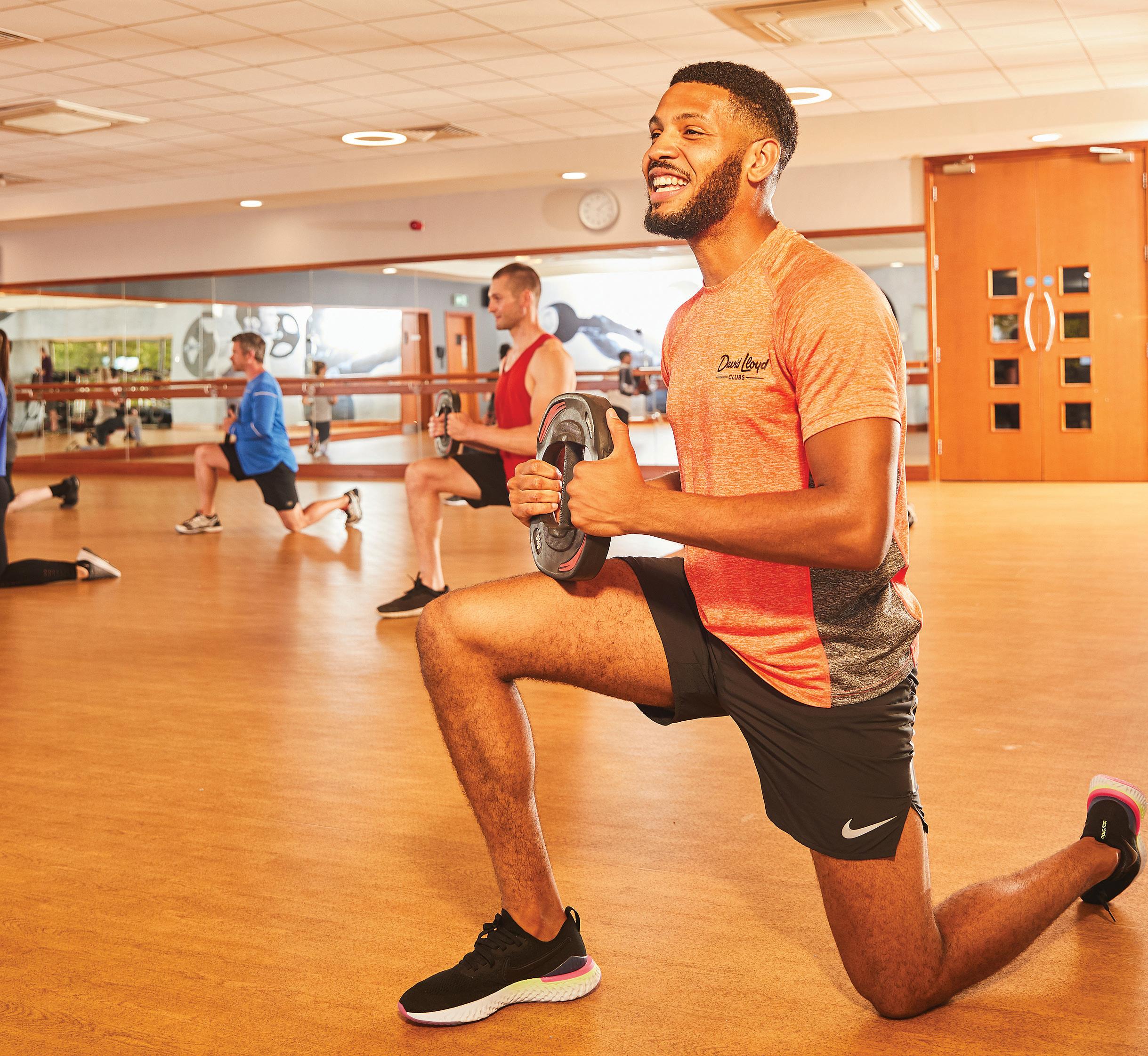
9 minute read
Ask An Expert
from HCM Issue 3 2021
Everyone’s talking about Group exercise
In spite of having met all government-agreed, COVID-secure operating standards, group exercise has had a rough ride during the pandemic, being closed more than gyms. HCM asks why this is and what can be done about it
The re-opening of gyms in England on 12 April will be a bittersweet moment.
Although it’s extremely heartening that gyms are opening before pubs in 2021 and testament to the progress made in terms of lobbying and the government’s understanding of the importance of exercise, it’s unfortunate that group exercise classes won’t be permitted until 17 May.
This delay is causing serious issues for health clubs that have group exercise at the core of their experience.
We look at the impact this is having on operators, how they’re adapting and whether the term ‘group exercise’ needs to be overhauled so it fits better with current political thinking? We ask the experts.
While gyms’ reopening date is 12 April, group exercise can’t restart until 17 May

photo: Davi D L L oy D L eisure
Glenn Earlam
David Lloyd
Although we breathe a collective sigh of relief as our sector can finally start to reopen, the reality is that a significant part of our offering remains closed.
We all understand how difficult these roadmap decisions must be for the government, but it is hard to understand the logic behind not allowing indoor group exercise to start again.
As an industry we have been able to clearly demonstrate we can operate safely. Ample social distancing measures, rigorous cleaning processes and reduced class numbers have all led to close to zero rates of transmission, yet indoor group exercise has been singled out for extended closure.
Group exercise has always been a vital part of our offering, and we are in a more fortunate position than most operators as we have been able to offer outdoor group exercise from the end of March. But we know a chunk of our membership will be reluctant to return until we can provide an indoor offering. This will inevitably slow the recovery of multiproduct facilities, not to mention the thousands of beleaguered HIIT and holistic exercise studio businesses which will remain closed.
Almost 30 per cent of David Lloyd Clubs’ membership base participate in group exercise. Seventy five per cent are female with an average age of just over 45. This more mature segment is painfully aware that age is a key factor in COVID-19 mortality and they are more conscious about their health than ever before. Yet we are unable to offer the very products which would help them to develop a new healthy lifestyle.
Many of our instructors are selfemployed, so left without work or income, while their much-needed skills and experience are being wasted. A whole army of wellqualified fitness professionals, eager to play their part in the nation’s recovery from a health crisis, are having to wait to the end of the pandemic before they can do so.
It’s a decision that defies logic and as an industry we need to campaign to persuade the government to reconsider.
Glenn Earlam says a percentage of members won’t come back until group exercise restarts
photo: Davi D L L oy D L eisure
Ed Stanbury
BLOK

At BLOK we only do group exercise, so it’s extremely frustrating that even when we’re allowed to open our doors on 12 April we won’t be able to give customers our usual product of instructor-led classes, because of these nonsensical rules.
I’ve yet to hear a logical answer as to why we can’t run group exercise and think there is a misunderstanding about how we operate and how the virus behaves, because we absolutely believe we can run group exercise in a safe environment.
We know when people are arriving, when they’re leaving and how many are in the club at one time. Most of our studios have external doors, so people queue up in a socially distanced way, are checked in outside, follow a marked one way system to their mat where they have their own wipes, antibacterial cleaner and hand sanitiser to clean their mat and equipment before and after the session.
The studios are running at half capacity, so everyone has plenty of space, plus we have state-of-the-art ventilation and air conditioning systems.
photo: blok
Stanbury is founder and CEO of boutique fitness studio BlOk

It’s a high level of control and when we launch properly on 17 May we will be following all the same protocols, except members will be able to follow an instructor instead of doing their own individual workout, as they will be doing from 12 April.
The presence of an instructor has no impact on the likely spread of a virus, and it would be far better to replace this arbitrary distinction with stricter guidelines on dedicated, distanced workout areas, with equipment being cleaned before and after each use and therefore eliminating the risk of transmission either through airborne particles or surface contact.
I don’t think the industry should have to rebrand group exercise to avoid governments making illinformed policies. The onus should be on the government to understand the industries they are legislating on, and to create guidelines which effectively protect the public.
David Alstead
ukactive
While the Government’s reopening roadmap for England prioritised indoor gyms, pools and leisure centres in the fi rst available stage for indoor venues (from 12 April), we were very disappointed that indoor exercise classes featured in a later stage, being unable to reopen until 17 May at the earliest.
Many of our members have group exercise as an integral part of their service offering, with boutique studios having this at their core, which means either they cannot reopen or it is not economically viable to reopen on 12 April if they are commercially reliant on classes.
There is understandable frustration because indoor classes are led by responsible trainers in accordance with the sector’s safety guidance. When ukactive


There is frustration among ukactive members, says Alstead
co-developed the framework for reopening with the government, we included indoor group exercise, focusing on maintaining social distancing, wiping down equipment between uses, ensuring a maximum occupancy based on 100sq ft, as well as having a track and trace system already in place.
We must continue to highlight to the government the strict safety measures in place. Alongside this, we have also proven an extremely low prevalence of COVID-19 among people who have visited fitness and leisure facilities, with ukactive providing the government with data from more than 2,000 sites, based on 75 million visits, showing an overall rate of just 1.7 cases per 100,000 visits (from July to December 2020), with no indication that these people caught COVID-19 at the gym or had it when they visited.
This decision could also have a detrimental impact on people served by a myriad of classes, such as older adults requiring strength classes which help prevent falls; cancer patients requiring prehab and rehab services; and those requiring weight management programmes. From our data we know the prolonged closure of group exercise will also disproportionately affect women.
In the meantime, group exercise classes are due to take place outside from 29 March. Many of our members with outdoor space are setting up equipment in the fresh air, following COVID-secure guidelines and the guidance on what is considered ‘outdoors’ when it comes to coverings. Our team is available to advise members on how to do this legally.

Martin Franklin
Les Mills
The safety of our community is our number one priority, so having a phased approach to the re-opening of society is important. That said, we know the COVID-safe protocols for group exercise are some of the most stringent and controllable from any business sector in the prevention of the virus. There is a significant proportion of the population which relies on group exercise: statistics show more than 4.86 million people in England were taking part in group exercise classes each week pre-COVID. Our 2019 Global Consumer Fitness Survey revealed that 45 per cent of gymgoers cite group exercise as the main reason for attending their gym, and those who attend group exercise classes go to the gym twice as often. Research from Alliance Leisure found that 96 per cent of consumers who tried a workout from a club during lockdown would use that facility when it reopened. While a survey of 9,000 Les Mills On Demand users found that 63 per cent of non-gym members are interested in trying live Les Mills classes in a club. So it is inevitable that this delay to group exercise will impact operators, putting some at risk of insolvency. Operators should continue to build on the successes they’ve had during lockdown in maintaining engagement and the innovative ways they’ve been able to connect with their members. This includes continuing with athome options and a mix of live and pre-recorded workouts. In the meantime, the sector should use the first month after reopening as an opportunity to get ready and build excitement among members for when they can get back to that first in-person class, by re-engaging members and instructors and planning launch events. Outdoor exercise is also a big opportunity and is already providing an exciting dimension to club timetables in markets which have re-opened. Les Mills has created a new outdoor group exercise guide and marketing campaign to support clubs in kicking things off with a bang in April.
Franklin has spoken out about the rules around group exercise
photo: les mills
l Download the report: www.HCMmag.com/lesmillsoutdoors
Ben Beevers
Everyone Active
The delay on the return to group exercise will have an effect on a number of Everyone Active sites, especially as last year we implemented COVID-safe measures – including social distancing and enhanced cleaning – which meant we did not have any recorded cases of the virus relating to our classes. With more than 200 centres across the UK, group exercise plays a key role in our offering to communities. In the week before the second lockdown, we welcomed 66,828 individuals to our classes and were running at close to 80 per cent of class capacity.
More than 60,000 individuals attend our group exercise classes routinely each week, so not being able to run them has a financial impact on our business, and a social impact on customers who don’t have access or equipment to exercise during lockdowns.

photo: everyone active Everyone Active did not record any COVID-19 cases in relation to group exercise in 2020








